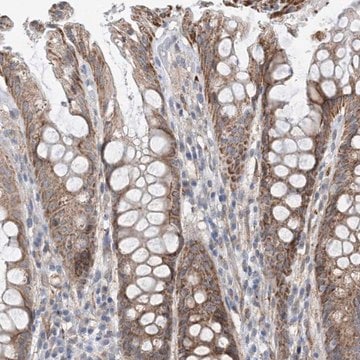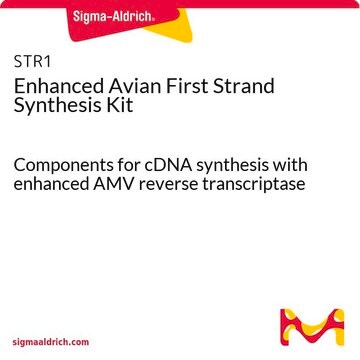03353621001
Roche
5′/3′ RACE Kit, 2nd Generation
sufficient for 10 reactions
Scegli un formato
636,00 €
Scegli un formato
About This Item
636,00 €
Prodotti consigliati
impiego
sufficient for 10 reactions
Livello qualitativo
Produttore/marchio commerciale
Roche
Condizioni di spedizione
dry ice
Temperatura di conservazione
−20°C (−15°C to −25°C)
Categorie correlate
Descrizione generale
Specificità
Transcriptor Reverse Transcriptase: 85 °C for 5 minutes
Applicazioni
- Structural and expression studies of RNA molecules[3]
- Generating full-length cDNAs[4][5]
- Isolation and characterization of 5′ or 3′ ends from low-copy RNA messages[6]
- first strand cDNA synthesis[6]
- Amplification and further cloning of rare mRNAs[6]
- Use in conjunction with exon-trapping methods
- Products of the RACE reaction can be directly sequenced without cloning
Caratteristiche e vantaggi
- Robust performance: Recombinant Transcriptor Reverse Transcriptase allows procession through regions of difficult secondary RNA structure.
- Convenient: Function and expression studies of either 5′ or 3′ end of the RNA can be performed with the same kit.
- Reliable: dA tailing of cDNA with Recombinant Terminal Transferase decreases the likelihood of inappropriate truncation.
- Reproducible: Oligo dT-anchor primer with non 3′dT ensures correct binding to the inner end of the poly (A) tail.
- Produce long fragments: Generate cDNA up to 14kb in length with Transcriptor Reverse Transcriptase.
Confezionamento
Altre note
Solo come componenti del kit
- cDNA Synthesis Buffer 5x concentrated
- Transcriptor Reverse Transcriptase 20 U/μl
- Deoxynucleotide Mix
- dATP, pH 7.5 (20 °C)
- Reaction Buffer 10x concentrated
- Terminal Transferase, recombinant
- Control neo-RNA 1 ng/μl
- Oligo dT-Anchor Primer
- PCR Anchor Primer
- Control Primer neo1/rev primer 12.5 μM
- Control Primer neo2/rev primer 12.5 μM
- Control Primer neo3/for primer 12.5 μM
Codice della classe di stoccaggio
12 - Non Combustible Liquids
Classe di pericolosità dell'acqua (WGK)
WGK 1
Punto d’infiammabilità (°F)
does not flash
Punto d’infiammabilità (°C)
does not flash
Scegli una delle versioni più recenti:
Possiedi già questo prodotto?
I documenti relativi ai prodotti acquistati recentemente sono disponibili nell’Archivio dei documenti.
I clienti hanno visto anche
Articoli
In addition to the troubleshooting provided in the product manual, most probably the efficiency of the tailing reaction performed by Terminal Transferase could be impaired. This could occur due to several reasons (which will not only affect the control reaction, but 5′ RACE in general):
Il team dei nostri ricercatori vanta grande esperienza in tutte le aree della ricerca quali Life Science, scienza dei materiali, sintesi chimica, cromatografia, discipline analitiche, ecc..
Contatta l'Assistenza Tecnica.









